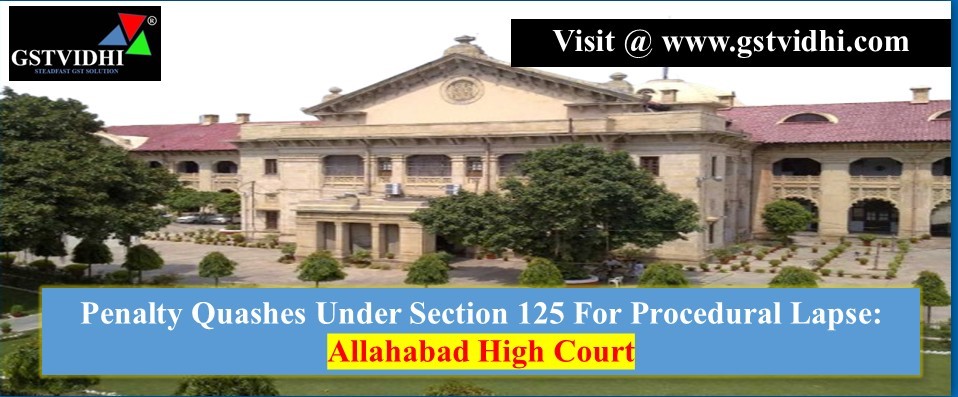
Penalty Quashes Under Section 125 For Procedural Lapse: Allahabad
High Court
M/s
Kahna Bartan Bhandar Vs. State of U.P. &
Others / Writ Tax No. 534 of
2025 | Decided on: 4 June 2025 | High Court of Judicature at Allahabad, Lucknow
Bench
Summary of
the Case
In a clear affirmation of
procedural fairness under GST law, the Allahabad High Court quashed a
penalty of ₹50,000 imposed on M/s Kahna Bartan Bhandar, holding
that fixing the date for filing reply and date of personal hearing on the same
day violates the principles of natural justice. The penalty was levied
under Section 125 of the CGST/SGST Act, which empowers authorities to
impose a general penalty in cases where no specific penalty is provided.
The Court not only set
aside the penalty but also quashed the appellate order dated 5 April 2025,
which had upheld the penalty. It remanded the matter for fresh adjudication
after giving proper opportunity to the petitioner.
Background
and Procedural History
1. Penalty
Proceedings Initiated: The petitioner was issued a Show
Cause Notice (SCN) under Section 125 of the CGST/SGST Act. The
notice proposed a penalty of ₹50,000 for unspecified violations.
2. Same-Day
Hearing and Reply Date: The SCN scheduled both the reply
deadline and the personal hearing on 17 September 2024, effectively
curtailing the petitioner’s ability to prepare and respond.
3. Ex
Parte Penalty Order Passed (20.09.2024): Without receiving a
detailed reply or providing adequate time, the department passed an ex parte
order, imposing the penalty.
4. Appeal
Rejected (05.04.2025): The petitioner filed an appeal, which
was dismissed, upholding the penalty.
5. Writ
Petition Filed: Challenging both the original and
appellate orders, the petitioner moved Writ Tax No. 534 of 2025, citing denial
of opportunity of being heard.
Key Legal
Issue
Whether fixing the same
date for filing reply and granting personal hearing violates principles of
natural justice under GST adjudication procedures?
Petitioner’s
Arguments
- The SCN violated basic principles of
natural justice as:
- The reply date and hearing date were
identical (17.09.2024);
- The petitioner had no opportunity
to prepare or submit a defense.
- Reliance was placed on earlier
judgments from the same High Court where similar procedural defects
resulted in quashing of orders.
- The penalty imposed was arbitrary and
unjustified due to lack of due process.
Respondents’
Submissions
- The department argued that:
- The notice was validly issued and
accessible via GST portal;
- Petitioner chose not to reply or
appear for the hearing;
- Therefore, the penalty order was
justified and in accordance with the law.
Court’s
Observations
1. Violation of Natural
Justice
Justice Manjive Shukla
observed:
“It is apparent that the
petitioner has not been given proper opportunity of hearing...”
Fixing the same date
for reply and personal hearing deprives the assessee of reasonable
opportunity to file submissions, a violation of Article 14 and 21
principles.
2.Settled Legal Position
The Court noted that it
is a settled proposition of law, through a catena of judgments,
that:
“The date for filing
reply and the date for personal hearing cannot be one and the same.”
This is because a reply
forms the basis of defense, and hearing is meant to elaborate and argue
upon it.
3. Writ Petition
Justified
Since procedural
safeguards were breached, the writ petition deserved to be allowed. The penalty
order and appellate confirmation could not stand in law.
Final
Judgment
1. Writ
Petition Allowed: The Court allowed Writ Tax No. 534 of
2025.
2. Orders
Quashed: Both:
o The
penalty order dated 20.09.2024, and
o The
appellate order dated 05.04.2025 were set aside.
3. Remand
for Fresh Decision: The matter was remanded to the
Assessing Authority, who must:
o Provide
proper opportunity to file reply;
o Grant
adequate time for hearing;
o Pass
a fresh speaking order in accordance with law.
Conclusion
The Allahabad High
Court’s decision in Kahna Bartan Bhandar v. State of U.P. reinforces
that justice cannot be delivered without process. Even when authorities
follow digital processes and statutory frameworks, the human element of
fairness and opportunity to defend must prevail.
By quashing a ₹50,000
penalty imposed under Section 125 solely for procedural lapse, the Court has
reemphasized that natural justice is a non-negotiable element of
adjudication under GST law.
Disclaimer: All the Information is based on the notification, circular advisory and order issued by the Govt. authority and judgement delivered by the court or the authority information is strictly for educational purposes and on the basis of our best understanding of laws & not binding on anyone.
Find the Attachment (Press on Click Here )
Click here